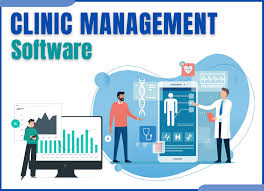CLINIC MANAGEMENT SOFTWARE

A Clinic Management Software is essentially software that helps clinics streamline their operations and deliver better healthcare. A typical clinic workflow involves the following. A patient blocks an appointment with a practicing doctor at the clinic. Registration of patient data is done at the time of visit. The doctor meets the patient and offers medical advice. Accordingly, the patient may have to get some diagnostic tests conducted or purchase the prescribed medicines.
Therefore, as per need, the patient would access the clinic lab and pharmacy. The treatment bill is generated as per services availed. So, apart from the treatment cycle, clinic operations and administration include upkeep of the clinic, staffing records, maintenance of various departments, including laboratory, pharmacy, emergency, housekeeping, etc. The clinic also has to maintain various inventories and stock as well as coordinate with other stakeholders such as diagnostic labs, medical equipment vendors, so on and so forth.
The dynamic working of clinics involves a lot of repetitive work, data generation, record keeping, and adherence to various regulatory and compliance policies. Based on a software-as-a-service (SaaS) model, a clinic management system helps integrate various functions and processes making the operations efficient and seamless for both patients and staff.
Why should clinics adopt this software?
Clinics should adopt Clinic Management System software because of its several benefits. The SaaS format makes the technology easy to adopt, install, and integrate with other systems. The plug-and-play solutions can manage all OPD requirements from booking appointments to getting prescriptions and lab reports. The following are some of the key advantages of adopting clinic management software.
Supports central management and consistency in healthcare delivery. Good SaaS Clinic Management Systems help clinics scale-up operations across geographies. Many chain clinics have more than one center. For them, the system helps centralize the management of all branches, making operations uniform and the quality of healthcare delivery consistent.
Makes it easy to book appointments. The software makes booking appointments, scheduling, and rescheduling simple and convenient. It can easily communicate the message with doctors and patients simultaneously in unique customized formats confirming the appointments or cancellations.
Integrates billing and accounting. At a clinic, bills are generated for multiple services at multiple points of care delivery. These points at which bills are usually generated include registration, consultation, diagnostic tests, physiotherapy, and pharmacy. It supports accurate booking keeping of all billing and accounting requirements of a clinic ensuring the transparent, clean, error-free recording of financial exchanges.
Accurate and safe data management. Clinics experience a higher frequency of repeat patients than hospitals and generate a lot of data. Patients need to be registered for the first time in the software, and their information can be retrieved thereafter. Clinics can store patients’ health records and lab reports as well for future reference. Backed by cloud computing technologies, the system supports easy and error-free storage of voluminous electronic health records. Good SaaS solutions invest in data security technologies of the global standard. Hence, digitalization of all data in a clinic, including patient records, supports safe and secure storage of data.
Improves operational efficiency. Clinic Management System improves efficiency across chain management of the healthcare center. It has applications across departments and functions at each intersection of clinic workflow.
Makes communication easy. A clinic has to manage various levels and degrees of inter-departmental and inter-stakeholder communication, which include intimation, reminders, alerts, and warnings. Digital technologies as the clinic management systems ensure that communications happen easily and timely.
Choosing the Right Clinic Management Software
With a variety of CMS options available, selecting the right one for your clinic is crucial. Consider factors like:
- Clinic size and specialty: Choose a software solution that caters to your specific needs, whether you are a small family practice or a specialty clinic.
- Features and functionality: Identify the functionalities most important for your clinic, such as appointment scheduling, telemedicine integration, or robust reporting tools.
- Scalability: Ensure the software can grow with your clinic, accommodating future needs.
- Budget: Compare pricing models and choose a solution that fits your financial constraints.
- Ease of use: Select a user-friendly software that minimizes training time for staff.
Leave a Reply